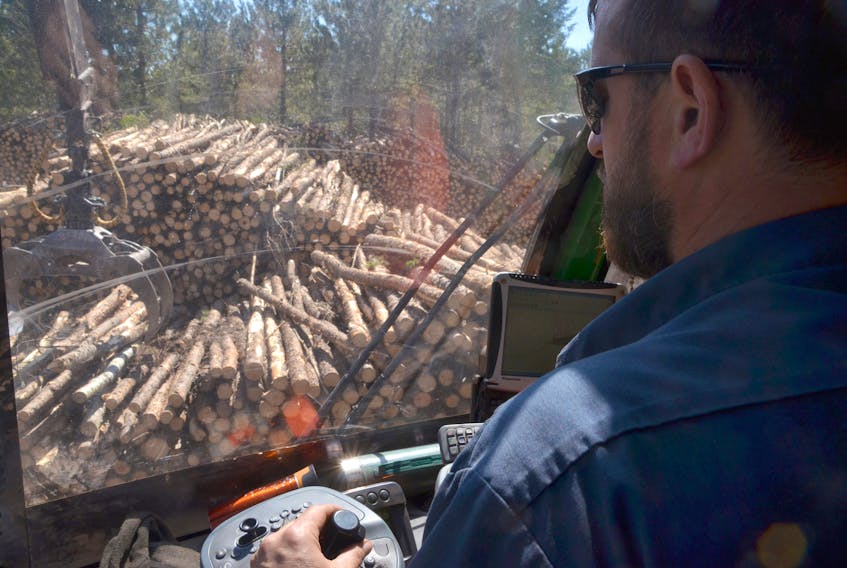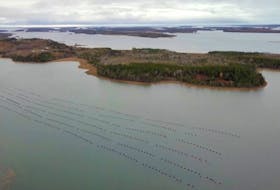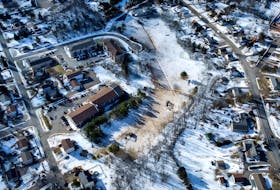EDITOR'S NOTE: This is the fourth story in a five-part series. In Part 4, we examine the future of the forestry sector in Atlantic Canada.


One of the oldest industries in Atlantic Canada is set to undergo a sweeping transformation over the coming decade, as technology, climate change and shifting consumer demands reshape forestry.
Despite U.S. tariffs on New Brunswick lumber and the expected closure of Northern Pulp in Nova Scotia, experts say the region’s forestry industry is focused on innovation to ensure long-term, sustainable growth.
“There's a real emergence of innovative technologies that are producing new products out of wood,” Forest NB executive director Mike Legere said in an interview.
“Nearly everything you can make out of a petroleum base ... you can make out of wood cellulose.”
The wide range of new uses for wood fibres to replace materials like plastics or cotton has kept demand for wood products strong, despite setbacks in the industry.
Same-old softwood issues


The centuries-old softwood lumber row between Canada and the U.S. resurfaced in 2017 when the U.S. Commerce Department claimed that Canadian companies were selling subsidized wood at unfair prices.
While Nova Scotia was exempted from the import duties, New Brunswick softwood exporters now face tariffs between roughly 10 and 20 per cent.
As prices surged in 2018 due to supply chain issues, exporters from New Brunswick didn’t immediately feel the impact of the duties.
But Legere said as prices stabilize, the tariff is taking its toll.
“The market corrected itself in 2019, and we saw a rapid decline in prices from 2018,” he said. “Softwood lumber prices dropped about 30 per cent, and when you add a 20 per cent tariff on top of that ... the margins are getting pretty slim.”
Still, Legere said New Brunswick forestry companies are buckling down and getting by — for now.
“We're holding our own, but it's concerning,” he said. “Prices have bumped up a little bit here in the last couple of months, which kind of takes the edge off. But that tariff continues to be a big issue for New Brunswick.”
Closing the pulp mill


Meanwhile, Nova Scotia continues to grapple with the fallout from the decision not to amend the Boat Harbour Act, which is widely expected to lead to the mothballing of Northern Pulp.
The move ensured Premier Stephen McNeil kept his promise to an Indigenous community impacted by the mill’s waste for the last 50 years.
But the closure of the Pictou County plant will “impact every inch of our sector,” said Jeff Bishop, executive director of Forest Nova Scotia.
“There’s a lot of uncertainty,” he said. “It will take some time before we understand what this is going to mean.”
The pulp mill is the largest player in the province's forestry industry, and it’s estimated that thousands of jobs could be lost.
Although some of the wood chips could be diverted to mills in Cape Breton or southern New Brunswick, Bishop said it can take years to established supply chains.
For example, he said after Resolute Forest Products shuttered the Bowater Mersey facility in 2012, it took half a decade for the market to recover.
“It's only been in the last 12, maybe 16 months that the actual market for pulpwood returned in that end of the province,” Bishop said.
In Newfoundland and Labrador, the forestry industry is expected to continue its rebound in the 2020s.
At a forestry summit last January, the provincial government outlined a plan to strengthen and diversify the forestry sector, including increasing wood harvesting and permit allocations by 20 per cent by 2022.
Premier Dwight Ball said at the time the action plan would help the province’s forestry sector “successfully navigate tariff challenges and strengthen existing operations.”
More on the decade ahead:









